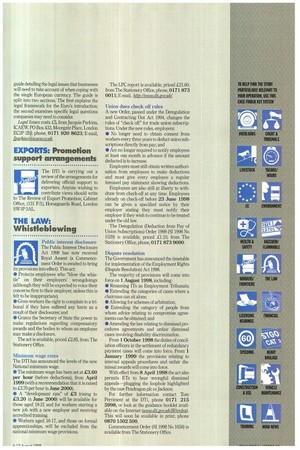THE LAW: Whistleblowing
Page 37

If you've noticed an error in this article please click here to report it so we can fix it.
wPublic interest disclosure The Public Interest Disclosure Act 1998 has now received Royal Assent (a Commencement Order is awaited to bring its provisions into effect). This act
• Protects employees who "blow the whistle" on their employers' wrongdoings (although they will be expected to voice their concerns first to their employer, unless this is felt to be inappropriate); • Gives workers the right to complain to a tribunal if they have suffered any harm as a result of their disclosures, and • Grants the Secretary of State the power to make regulations regarding compensatory awards and the bodies to whom an employee may make a disclosure.
The act is available, priced £2.85, from The Stationery Office.
Minimum wage rates The DTI has announced the levels of the new National minimum wage.
• The minimum wage has been set at £3.60 per hour (before deductions), from April 1999 (with a recommendation that it is raised to £3.70 per hour in June 2000).
• A "development rate" of £3 (rising to £3.20 in June 2000) will be available for those aged 18-21 and for workers starting a new job with a new employer and receiving accredited training
• Workers aged 16-17, and those on formal apprenticeships, will be excluded from the national minimum wage provisions.
The LPC report is available, priced £21.60, from The Stationery Office, phone, 0171 873 0011; E-mail, http://wwwitizovuk/.
Union dues check off rules
A new Order, passed under the Deregulation and Contracting Out Act 1994, changes the rules of "check off" for trade union subscriptions. Under the new rules, employers: • No longer need to obtain consent from workers every three years to deduct union subscriptions directly from pay; and • Are no longer required to notify employees at least one month in advance if the amount deducted is to increase.
Employers must still obtain written authorisation from employees to make deductions and must give every employee a regular itemised pay statement showing deductions.
Employees are also still at liberty to withdraw from check-off at any time. Employees already on check-off before 23 June 1998 can be given a specified notice by their employer stating they must notify their employer if they wish to continue to be treated under the old law.
The Deregulation (Deduction from Pay of Union Subscriptions) Order 1998 (SI 1998 No 1529) is available, priced £1.10, from The Stationery Office, phone, 0171 873 9090.
Dispute resolution
The Government has announced the timetable for implementation of the Employment Rights (Dispute Resolution) Act 1998.
The majority of provisions will come into force on 1 August 1998, including:
• Renaming ITs as Employment Tribunals; • Extending the categories of cases where a chairman can sit alone; • Allowing for schemes of arbitration; • Extending the category of people from whom advice relating to compromise agreements can be obtained; and • Amending the law relating to dismissal procedures agreements and unfair dismissal cases involving disability discrimination.
From 1 October 1998 the duties of conciliation officers in the settlement of redundancy payment cases will come into force. From 1 January 1999 the provisions relating to internal appeals procedures and unfair dismissal awards will come into force.
With effect from 8 April 1998 the act also permits ETs to hear wrongful dismissal appeals—plugging the loophole highlighted by the case Pendragon plc vs Jackson.
For further information contact Tom • Perriment at the DTi, phone 0171 215 5998, or look at the guidance booklet available on the Internet (uncuudtigov.uk/IR/erdra). This will soon be available in print; phone 0870 1502 500.
Commencement Order (SI 1998 No 1658) is available from The Stationery Office.












































































































